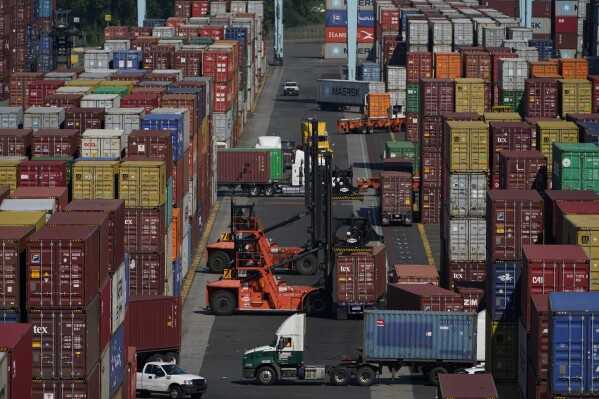By Tom Krisher
Associated Press
(AP) – With a dockworkers’ strike threatening to close ports on the East and Gulf coasts beginning this week, Chris Butler is growing worried.
Butler is CEO of the National Tree Company, and, like many businesses, his is counting on shipments that are en route from Asia but won’t reach their ports before an expected strike by longshoremen starting at 12:01 a.m. Eastern time Tuesday.
The company, based in New Jersey, is an importer of artificial Christmas trees and other holiday decorations. If a strike were to last just a few days, there might be time afterward to unload the trees, transport them to warehouses and have them ready for customers this season.
Yet if a strike were to keep ports closed until, say, November, about 150,000 trees might not arrive in time for the peak shopping season, imposing costs on National Tree and other businesses. In a worst-case scenario, those costs, multiplied across industries, could fuel inflation and pressure the U.S. economy.
“Definitely not an ideal situation,” Butler said.
National Tree already has stockpiled or delivered most of the roughly 2 million artificial trees it sells each year. But it would lose revenue if 150,000 of the trees got stuck in the pipeline.
Other businesses face the same predicament, with goods that could be stranded at sea if 45,000 members of the International Longshoremen’s Association make good on their threat to strike. They could shut down 36 ports from Maine to Texas that handle about half the goods shipped into and out of the United States. (West Coast dockworkers belong to a different union and aren’t involved in the strike.)
A prolonged strike would force companies to pay shippers for the delays, and goods could arrive too late for the high point of holiday shopping season. On Friday, top Biden administration officials met with port operators and told them they should negotiate with the union ahead of Tuesday, according to a White House official who insisted on anonymity to discuss an ongoing meeting.
Butler says he’s hoping for an agreement or for government intervention to halt a strike. But the U.S. Maritime Alliance, which represents shippers and ports, and the longshoremen’s union haven’t met since June. And no talks are scheduled before their contact expires late Monday.
“ILA unity remains strong and is growing,” James McNamara, spokesman for the International Longshoremen’s Association, said in a statement Sunday. He said the union would update the public on any new developments by 11 a.m. Monday.
The union is demanding significantly higher wages and a total ban on the automation of cranes, gates and moving containers in the loading and unloading of freight.
The Toy Association, the nation’s leading toy trade group, was among about 200 organizations that asked President Joe Biden in a letter this month to work with both sides to reach an agreement. The National Grain and Feed Association also urged Biden to take action to avert a strike, which would come just as harvest season gets underway.
Their push has put Biden and Vice President Kamala Harris, the Democratic presidential nominee, in a sensitive position: Both have courted union support and don’t want to be seen as pressuring the longshoremen to reach a settlement. Yet if an extended strike were to cause shortages of consumer goods or fuel high inflation, it could cost Harris votes in the November election.
Under the Taft-Hartley Act, Biden could seek a court order to suspend the strike for an 80-day cooling-off period. Robyn Patterson, a White House spokesperson, said in a statement that the administration has never invoked the act and isn’t considering it now.
Biden and Congress did step in two years ago to block a looming freight rail strike and force those workers to accept a deal because of widespread fears that a rail strike would have damaged the economy.
Alex Hertel-Fernandez, an associate professor of international and public affairs at Columbia University who served as a Labor Department official under Biden, suggested that the administration will follow the playbook it used in talks last year between West Coast ports and the union there: Mediating negotiations without directly intervening.
Greg Ahearn, CEO of the Toy Association, said a strike would happen at a critical moment for toy sellers and makers: Up to 60% of annual sales occur from October through December. Though some toy companies shipped goods earlier, Ahearn said a strike would make it hard to replenish hot-selling items.
A strike, he warned, could raise toy prices “based on scarcity and increased costs.”



















